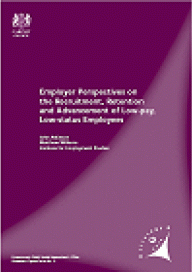Publications
 We author and publish a range of resources to keep you up to date with the latest developments in employment, labour market and human resource policy and practice.
We author and publish a range of resources to keep you up to date with the latest developments in employment, labour market and human resource policy and practice.
All our pdf publications are free to access.
Search results
-
📄
Survivor Syndrome
Key Considerations and Practical Steps
Wolfe H | Jan 2004 | Institute for Employment StudiesDespite the relative lack of empirical work about survivor syndrome, there seems little doubt of its existence, and the challenges it poses not only to the HR function, but also the organisation as a whole. Strategies for tackling such an issue are highly organisation-specific, but there are several overriding themes and considerations that may help inform approaches to current, and future, organisational change.
-

Healthy Attitudes
Quality of Working Life in the London NHS, 2000-2002
Robinson D, Perryman S (eds) | Dec 2003 | Institute for Employment StudiesThe first Human Resource Strategy for the NHS ('Working Together') was published in September 1998. This required all NHS employers to carry out annual surveys of the attitudes of their staff. Since then, IES conducted three annual London-wide surveys, on behalf of a total of 99 London employers. A total of 97,000 employees at all levels completed questionnaires. This report encapsulates their views.
-

Employer Perspectives on the Recruitment, Retention and Advancement of Low-pay, Low-status Employees
Atkinson J, Williams M | Jun 2003 | Cabinet OfficeLow skill, low status jobs in the UK can constitute a first step on a ladder to rising lifetime earnings, in which experience, tacit skills, contacts and know-how can be acquired and used to promote a pay off later. However, in practice, they provide little or no basis for substantial advancement through the labour market: the evidence suggests that short-term mobility in the wage distribution is limited, and that individuals who do progress, do not generally progress very far.
-
📄
Defining and Creating Employee Commitment
a Review of Current Research
Robinson D | Mar 2003 | Institute for Employment StudiesOver the past ten years, the study of commitment has advanced in many different directions. A variety of disciplines have adopted the topic as a theme in their research and these have offered fresh and significant insights. These recent advances include new approaches to both the conceptualisation of employee commitment and the particular human resource practices intended to increase it. This review discusses the definition of commitment and its creation based on IES' extensive experience of working in this area and a comprehensive literature review.
-
📄
Questions to Measure Commitment and Job Satisfaction
Hayday S | Feb 2003 | Institute for Employment StudiesAs the title suggests, this paper identifies questions measuring employee commitment and job satisfaction. There are limitations to measuring morale and motivation by direct questions about their levels. The more practical approach of using statements about commitment and job satisfaction as indicators was discussed as these provide greater understanding of the issues.
-
📄
Organisational Citizenship Behaviour
Possible Attitude Statements
Feb 2003 | Institute for Employment StudiesThis paper suggests attitude statements that test organisational citizenship behaviour.
-
📄
Managing Staff Retention
Bevan S | Jul 2001 | Institute for Employment StudiesIt wasn't so long ago that UK employers were worried about labour surpluses. Inevitably, as recession turns into boom, concern about growing levels of employee turnover and skill shortages bubble up once more. So are employers right to press the panic button again? Should they brace themselves once more for long-forgotten turbulence in the labour market?
-
📄
From People to Profits
The HR link in the service-profit chain
Barber L, Hayday S, Bevan S | May 1999 | Institute for Employment StudiesThis report presents the results of the most detailed UK work yet to explore how employee attitudes and behaviour can improve customer retention and, as a consequence, company sales performance. It presents compelling data to demonstrate these links, highlights the 'Attitude Chain' model which underpins it, and highlights how other businesses can take this work forward in their own markets.
-
📄
Trust and Transition: Managing Today's Employment Relationship
Herriot P, Hirsh W, Reilly P | Feb 1998 | John Wiley & SonsThis book identifies the two key problems facing senior managers and HR directors: employees' feelings of mistrust and insecurity, and their effects on the employment relationship; and the speed of organisational change which requires employees to make continuous transitions. This book shows that the management of careers in organisations is still possible if career transitions are negotiated with employees, supported by management, and hence recreate trust.
-
📄
Keeping the Best: A Practical Guide to Retaining Key Employees
Bevan S, Barber L, Robinson D | Oct 1997 | Institute for Employment StudiesRather than panic and throw money at the problem, it is important that employers adopt more considered and targeted approaches to keeping their best employees. This practical guide demonstrates that, through careful risk analysis and targeting of retention measures, losses of key people can be both predicted and prevented. The guide includes turnover costs checklist, retention risk analysis, and exit interview questionnaire.
